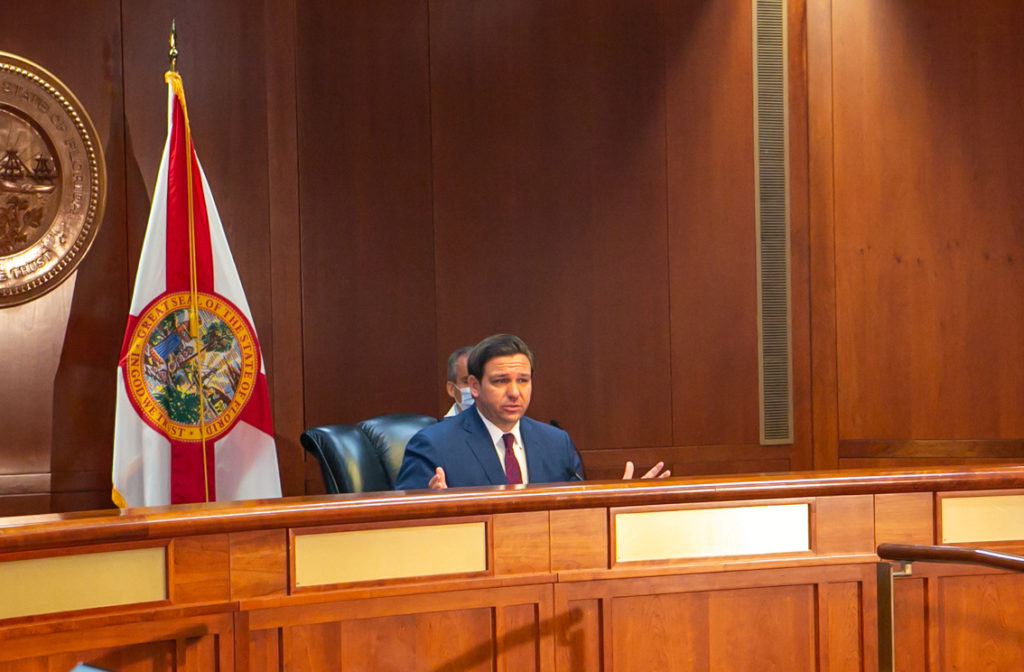Individual Freedoms bill headed to Gov. DeSantis’ desk
(The Center Square) – An “Individual Freedoms” bill has passed both chambers of the legislature and is headed to Gov. Ron DeSantis’ desk. He’s expected to sign it.
It reads in part, “A…

(The Center Square) – An “Individual Freedoms” bill has passed both chambers of the legislature and is headed to Gov. Ron DeSantis’ desk. He’s expected to sign it.
It reads in part, “A person should not be instructed that he or she must feel guilt, anguish, or other forms of psychological distress for actions, in which he or she played no part, committed in the past by other members of the same race or sex.” It applies to K-12 public schools.
Democratic state Sen. Shevrin Jones said it’s “a continuation of a national agenda to whitewash history all because we don’t want white children to feel uncomfortable about true Black history,” the Associated Press reported.
While some in the media describe it as racist or limiting discussion about race, it “includes the most substantial expansion of African American history in our public schools in the past 20 years,” Republican House Speaker Chris Sprowls says.
HB 7, filed by Republican Speaker pro tempore Rep. Bryan Avila of Miami Springs, passed the House on Feb. 24 by a vote of 74 to 41.
Its companion bill, SB 148, filed by state Sens. Manny Diaz Jr. and Ray Wesley Rodrigues, both Republicans, passed the Senate March 10 by a vote of 24 to 15.
Diaz, a Cuban-American, said he doesn’t want what happens in Cuba, where he says people are told what to think, to happen in America.
“My parents left that country because education wasn’t about creating thinkers, it wasn’t about having a debate like the one we’re having today. That wasn’t allowed. It was about indoctrination. Indoctrination by the government to tell you what you must think,” he said. “We send our students to school to learn, to be thinkers, not to be told what to think. … No one is trying to wash out or erase history.”
The bill “upholds the American belief that all people are created equal with provisions to ensure that education materials and instruction in Florida’s schools and workplaces are consistent with this shared value,” Sprowls said.
The bill revises requirements for required instruction on the history of African Americans in public schools and requires the state Department of Education to prepare and offer certain standards and curriculum, according to the bill summary. It includes a range of guidelines for instructional materials and requires the department to review school district professional development systems for compliance with certain provisions of law. It also states that subjecting individuals “to specified concepts under certain circumstances constitutes discrimination based on race, color, sex, or national origin.”
Sprowls says the bill will ensure “we can have healthy instruction and conversation about race and diversity without losing sight that we are first and foremost individuals. Importantly, the bill provides assurance for parents that some of the most difficult lessons about our nation’s history and current events are taught without imputing false blame or guilt on their children.”
The bill includes “a call to share the stories of Americans who overcame all odds, including racial barriers, to make history and to inspire the next generation of achievers.”
Avila said the bill was designed “to address instruction and trainings that distort historical facts or push students to adopt the personal or political viewpoints of teachers or textbook authors, including divisive ideas that factors such as race or sex primarily determine a person’s character or potential.”
Notably, the bill calls for a new “Stories of Inspiration” curriculum to be taught about influential African Americans who made invaluable contributions to the United States under incredibly difficult circumstances.
Inspired by the New Hampshire video series produced in coordination with the Woodson Center, the bill directs the Department of Education to oversee the curriculum.
The popular New Hampshire series has been profiled in local news outlets. During Black History Month, The Nashua Telegraph published a “Stories of Courage” series profiling notable African Americans in collaboration with the New Hampshire Department of Education and the Woodson Center.
The Woodson Center’s K-12 Black history and character curriculum “tells the stories of black Americans whose tenacity and resilience enabled them to overcome adversity and make invaluable contributions to our country. It also teaches character and decision-making skills that equip students to take charge of their futures.” Its lessons are free and available to the public.
The most recent profile was of Bridget “Biddy” Mason, an early American pioneer and philanthropist who won her freedom in court in 1856. She became one of the first prominent citizens and landowners in Los Angeles in the 1850s-1860s. Born in Mississippi, she would later walk 1,700 miles behind a 300-wagon caravan to Salt Lake Valley in Utah in 1848. She eventually received her freedom in California. She founded the First African Methodist Episcopal Church in Los Angeles in 1872.
Another profile is that of Booker T. Washington, who was born into a slave family on a Virginia plantation. After the Civil War, he pursued educational opportunities and later founded the Tuskegee Normal and Industrial Institute, now Tuskegee University in Alabama, in 1881.
He later hired George Washington Carver to teach agriculture at Tuskegee in 1896. Carver, an agricultural scientist who invented hundreds of products using peanuts, was also a freed slave. His educational pursuits led him to earn a master’s degree in agricultural science at Iowa State University.
Washington also founded the National Negro Business League and advised Presidents Theodore Roosevelt and William Howard Taft.
The legislature hopes the new curriculum will inspire Florida students.
Senate Majority Leader Debbie Mayfield said Florida students “should be learning about important historical facts and movements, not divided by educators with a political agenda that blames young children for horrible historic events they had nothing to do with.
“Likewise, required workplace training should include elements that focus on respect and celebrate diversity and inclusion. Employees should not be subjected to required training that tears down and divides people based on race. To reinforce these principles, we passed meaningful legislation to protect individual freedoms and prevent discrimination in schools and the workplace, while supporting factual educational instruction and materials for students.”



